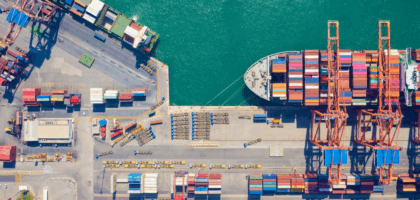The freight forwarding industry is crucial for the global economy, allowing goods to be moved around the world and helping businesses run smoothly. However, it also significantly impacts the environment with the transportation of goods greatly contributing to greenhouse gas emissions. As concerns about climate change continue to grow, there is an increasing need for the freight forwarding industry to pivot to sustainable logistics practices.
What is “Sustainable Logistics?”
Sustainable logistics aims to reduce the environmental threat arising from industrial and commercial activity by reinventing the way supply chains serve client around the world.
According to McKinsey’s Sustainability & Resources Productivity report, the world’s population is estimated to grow by 1.5 billion by 2035. This will ultimately cause a sharp increase in demand for shipping services across the globe.
How can the logistics industry help create a more sustainable approach to their solutions?
With businesses and consumers continually demanding and expecting speed and convenience when it comes to shipping, the industry needs to focus on minimizing the impact moving freight has on the environment.
Here are some of the ways the industry is working to reduce environmental harm and increase sustainability.
1. Implement green warehousing practices and sustainable packaging.
One of the best ways for companies to increase sustainability is by establishing green warehousing practices, such as increasing the use of solar power, hydropower, and LED lighting. Reducing energy and water usage are also efficient ways for companies to lessen their environmental impact and simultaneously save money. Biodegradable and recyclable packaging materials can also help companies reduce their emissions and waste. Additionally, decreasing the overall amount of packaging used can help increase efficiency and reduce shipping costs.
2. Shift to more sustainable modes of transportation (when possible) and improve route optimization.
Transportation of goods has one of the largest environmental impacts, emphasizing the importance of shifting to more sustainable vehicles. Electric and hybrid vehicles can be used for most local shipments, which are generally more energy-efficient and emit fewer greenhouse gases. Additionally, companies can reduce the amount of fuel used and the distance traveled by combining shipments and optimizing routes. Communication and effective route planning can help companies achieve this goal.
3. Establish partnerships and encourage collaboration.
By working together and combining resources, companies can maximize their strengths and increase sustainability. This can include partnerships and collaborations, such as ICAT’s partnership with SmartWay. By partnering with SmartWay, we have been able to lower transportation emissions and improve supply chain fuel efficiency.
The freight forwarding industry plays a large role in the transition to a more sustainable economy. By adopting more sustainable practices, companies can reduce their environmental impact as well as improve overall efficiency. As concerns about climate change continue to grow, the need for sustainability in the industry will only become more critical, making it essential for companies to act now.
How are we doing our part?
At ICAT Logistics, we recognize the importance of sustainability and strive to make a positive impact on the environment and society. We actively participate in eco-friendly practices and initiatives, including:
- Reducing our use of paper through EDI capabilities to transmit and receive shipment documentation, as well as utilizing ACH and paperless invoices for our customers;
- Participating in the SmartWay Program to reduce our carbon footprint through the use of more environmentally conscious carriers;
- Focusing on supply chain sustainability by measuring, benchmarking, and improving freight transportation efficiency;
- Educating our team members on the importance of reusing and repurposing materials; and
- Working with charities who care about corporate responsibility and helping their communities.
Resources:
- Sustainable Logistics: The Ultimate Guide (Procurement Tactics)
- 5 Tips to Navigate Sustainable Logistics (Forbes)
- Why Freight Matters to Supply Chain Sustainability (EPA)
- Green Warehousing & Sustainable Warehouse (Agility)
- Sustainable Logistics – Why it’s Essential (Shipa)



